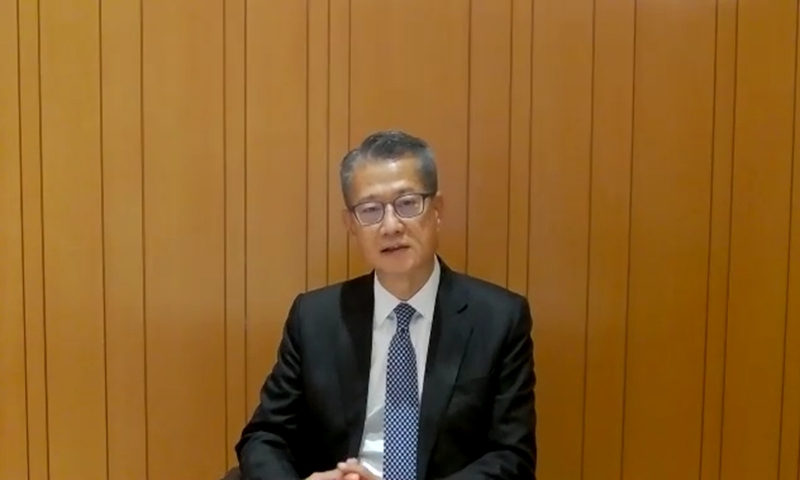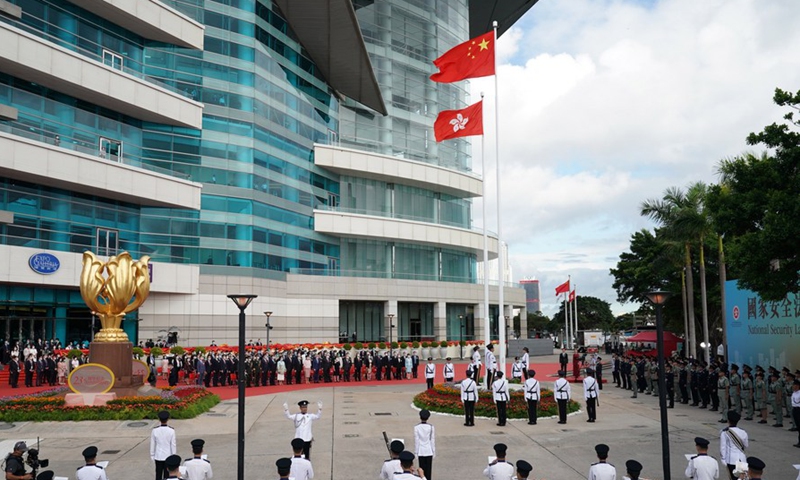SOURCE / INDUSTRIES
No need for US consent on LERS regime: HK financial chief
There is no need to ask for US consent on a decades-old exchange rate system linking Hong Kong's local currency and the US dollar, Hong Kong Financial Secretary Paul Chan Mo-po said Wednesday, as the recent investors' chase after Chinese assets underpins the strength of the local currency.
Chinese central government's strong support for the city in the financial sphere also props up the city's financial strength, Chan said in an exclusive interview with the Global Times. "If needed, we can kick off [currency] swap agreements, exchanging Hong Kong dollars for US dollars."
The Hong Kong dollar tipped the strong end of its trading peg against the greenback Wednesday, prompting a fresh intervention by the local monetary authority to maintain the linked exchange rate system (LERS).

The aggregate balance, a gauge of liquidity in the local banking system, climbed to HK$138.8 billion ($17.9 billion) from the previous day's closing reading of HK$131.6 billion, according to statistics released by the Hong Kong Monetary Authority.
Liquidity injections into the market were activated as the local currency hit 7.75 against the greenback, the strong end of the 7.75-7.85 band under the LERS.
The dollar peg was launched in 1983 and has been in place for over 30 years, while the US Hong Kong Policy Act was not passed until 1992.

What matters most is whether Hong Kong has the capability to continue to put the system in motion, the financial secretary said, citing the city's massive foreign exchange reserves of $440 billion - which is an indication of the city's financial power. He also noted the strength of the city's banking system, which is known for its high quality and ample liquidity.
Capital adequacy ratios prevailing in local banks are at approximately 20 percent, well above the international standard of 8 percent. The local banking system holds a liquidity coverage ratio of 160, far higher than the international requirement of 100 percent. Furthermore, the local non-performing and bad loan ratio stands at less than 0.6 percent, a fairly low level globally, according to Chan.
The spillover effects of the US Federal Reserve's quantitative easing render the higher-yielding Hong Kong dollar more alluring for investors, which added to the recent market chase after Chinese-yuan denominated assets, underpin the strength of the local currency, market watchers said.
They expect the currency strength to continue for the foreseeable future that essentially counteracts any US threats to undermine the peg in the wake of the newly adopted national security law for the city.
The US has acted ambitiously in printing money to bolster its slowing economy, substantially lowering the yields of the greenback, reversing the US dollar's long-lasting higher yields compared with the Hong Kong dollar, a marketing manager of a Chinese-invested financial institution in Hong Kong, who gave his surname as Zhao, told the Global Times Wednesday.
A flurry of US-listed Chinese firms has opted for secondary listing in the Hong Kong stock market, funneling funds into the local market and consequently making the local currency a more desirable option, Zhao said.
A strong local currency injects confidence into the local market in the face of noise from the US. Trump's top advisers contemplated proposals to undermine the Hong Kong currency's dollar peg, Bloomberg reported Tuesday.
In a blog post in June, Eddie Yue, chief executive of the HKMA, also wrote that the authority "has the capability, resources and commitment to safeguard Hong Kong's monetary and financial stability."
"The local financial market continues to operate in a smooth and orderly manner, reflecting strong market confidence in the LERS, a regime that is clear, transparent and proven to work well," Yue said.
Worthy of note is the strengthening yuan amid an eye-catching rally in the nation's stock markets. This is considered to speak fundamentally of a well-paced economic reboot in China, analysts said.
Various indicators measuring China's economic fundamentals see signs of a marginal improvement due to the nation's effective containment of coronavirus outbreak, propping up the yuan, Wu Jinduo, head of fixed income at the research institute of Great Wall Securities, told the Global Times Wednesday.
Meanwhile, the weakening of the US dollar index, on the back of US economic weakness, pushes onshore and offshore yuan to strengthen against a slew of currencies, Wu said, noting that the adoption of the national security law for Hong Kong is stabilizing the local market.
Global Times
Chinese central government's strong support for the city in the financial sphere also props up the city's financial strength, Chan said in an exclusive interview with the Global Times. "If needed, we can kick off [currency] swap agreements, exchanging Hong Kong dollars for US dollars."
The Hong Kong dollar tipped the strong end of its trading peg against the greenback Wednesday, prompting a fresh intervention by the local monetary authority to maintain the linked exchange rate system (LERS).

Hong Kong Financial Secretary Paul Chan Mo-po Photo: Screenshot of GT interview
The aggregate balance, a gauge of liquidity in the local banking system, climbed to HK$138.8 billion ($17.9 billion) from the previous day's closing reading of HK$131.6 billion, according to statistics released by the Hong Kong Monetary Authority.
Liquidity injections into the market were activated as the local currency hit 7.75 against the greenback, the strong end of the 7.75-7.85 band under the LERS.
The dollar peg was launched in 1983 and has been in place for over 30 years, while the US Hong Kong Policy Act was not passed until 1992.

A flag-raising ceremony is held by the government of the Hong Kong Special Administrative Region to celebrate the 23rd anniversary of Hong Kong's return to the motherland at the Golden Bauhinia Square in Hong Kong, south China, July 1, 2020. (Xinhua/Li Gang)
What matters most is whether Hong Kong has the capability to continue to put the system in motion, the financial secretary said, citing the city's massive foreign exchange reserves of $440 billion - which is an indication of the city's financial power. He also noted the strength of the city's banking system, which is known for its high quality and ample liquidity.
Capital adequacy ratios prevailing in local banks are at approximately 20 percent, well above the international standard of 8 percent. The local banking system holds a liquidity coverage ratio of 160, far higher than the international requirement of 100 percent. Furthermore, the local non-performing and bad loan ratio stands at less than 0.6 percent, a fairly low level globally, according to Chan.
The spillover effects of the US Federal Reserve's quantitative easing render the higher-yielding Hong Kong dollar more alluring for investors, which added to the recent market chase after Chinese-yuan denominated assets, underpin the strength of the local currency, market watchers said.
They expect the currency strength to continue for the foreseeable future that essentially counteracts any US threats to undermine the peg in the wake of the newly adopted national security law for the city.
The US has acted ambitiously in printing money to bolster its slowing economy, substantially lowering the yields of the greenback, reversing the US dollar's long-lasting higher yields compared with the Hong Kong dollar, a marketing manager of a Chinese-invested financial institution in Hong Kong, who gave his surname as Zhao, told the Global Times Wednesday.
A flurry of US-listed Chinese firms has opted for secondary listing in the Hong Kong stock market, funneling funds into the local market and consequently making the local currency a more desirable option, Zhao said.
A strong local currency injects confidence into the local market in the face of noise from the US. Trump's top advisers contemplated proposals to undermine the Hong Kong currency's dollar peg, Bloomberg reported Tuesday.
In a blog post in June, Eddie Yue, chief executive of the HKMA, also wrote that the authority "has the capability, resources and commitment to safeguard Hong Kong's monetary and financial stability."
"The local financial market continues to operate in a smooth and orderly manner, reflecting strong market confidence in the LERS, a regime that is clear, transparent and proven to work well," Yue said.
Worthy of note is the strengthening yuan amid an eye-catching rally in the nation's stock markets. This is considered to speak fundamentally of a well-paced economic reboot in China, analysts said.
Various indicators measuring China's economic fundamentals see signs of a marginal improvement due to the nation's effective containment of coronavirus outbreak, propping up the yuan, Wu Jinduo, head of fixed income at the research institute of Great Wall Securities, told the Global Times Wednesday.
Meanwhile, the weakening of the US dollar index, on the back of US economic weakness, pushes onshore and offshore yuan to strengthen against a slew of currencies, Wu said, noting that the adoption of the national security law for Hong Kong is stabilizing the local market.
Global Times


